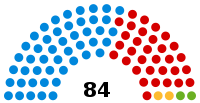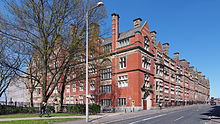| Lancashire County Council | |
|---|---|
 | |
 | |
| Type | |
| Type | Non-metropolitan county |
| Established | 1 April 1974 |
| Leadership | |
| Chair | Alan Cullens, Conservative since 15 September 2023 |
| Leader | Phillippa Williamson, Conservative since 27 May 2021 |
| Chief Executive | Angie Ridgwell since 3 January 2018 |
| Structure | |
| Seats | 84 councillors |
 | |
| Political groups |
|
| Length of term | 4 years |
| Elections | |
| Voting system | First-past-the-post voting |
| Last election | 6 May 2021 |
| Next election | 1 May 2025 |
| Meeting place | |
 | |
| County Hall, Fishergate, Preston, PR1 8XJ | |
| Website | |
| www | |
Lancashire County Council is the upper-tier local authority for the non-metropolitan county of Lancashire, England. The non-metropolitan county of Lancashire is smaller than the ceremonial county, which additionally includes Blackburn with Darwen and Blackpool. The council is based in County Hall, Preston, and consists of 84 councillors.
Since the 2017 election, the council has been under Conservative control. Before the 2009 Lancashire County Council election, the county had been under Labour control since 1989. The leader of the council is Conservative councillor Phillippa Williamson, appointed in 2021, chairing a cabinet of eight. The Chief Executive and Director of Resources is Angie Ridgwell, who was appointed in 2018.
The council is the successor to the county council of the administrative county of Lancashire, which was created on 1 April 1889. The council was abolished and reconstituted in 1974, when local government in England was reformed and a non-metropolitan county of Lancashire was created, governed by a county council and thirteen district councils. The districts of Blackpool and Blackburn with Darwen became unitary authorities in 1998, meaning they are no longer governed by Lancashire County Council.
History
Elected county councils were created in 1889 under the Local Government Act 1888, taking over many administrative functions that had previously been performed by unelected magistrates at the quarter sessions. The areas covered by the new county councils were termed administrative counties. Several larger towns and cities were considered capable of providing their own county-level services and so they were excluded from the administrative county, becoming instead county boroughs. When the county council was established in 1889 there were 15 county boroughs in the wider geographic county of Lancashire:
- Barrow-in-Furness
- Blackburn
- Bolton
- Bootle
- Burnley
- Bury
- Liverpool
- Manchester
- Oldham
- Preston
- Rochdale
- St Helens
- Salford
- Stockport (part)
- Wigan
Three more towns were later elevated to become county boroughs: Warrington in 1900, Blackpool in 1904, and Southport in 1905.
The 1888 Act also placed each urban sanitary district which straddled county boundaries in one administrative county, and so Lancashire gained the parts of Ashton under Lyne, Stalybridge, and Warrington which had been in Cheshire, and the parts of Mossley which had been in Cheshire and Yorkshire. Lancashire ceded its part of Todmorden to the West Riding of Yorkshire.
The county council formally came into being on 1 April 1889 and held its first official meeting on 4 April 1889 at County Hall in Preston, the courthouse (completed 1882) which had served as the meeting place for the quarter sessions which preceded the county council. John Tomlinson Hibbert, a Liberal who had previously been the Member of Parliament for Oldham, was appointed the first chairman of the council.
Lancashire was reconstituted under the Local Government Act 1972 with some significant changes to its territory, notably ceding significant areas in the south to Greater Manchester and Merseyside and in the north to Cumbria, whilst gaining more modest areas from Yorkshire to the east. In 1998 Blackburn with Darwen and Blackpool were both made unitary authorities, making them independent from the county council.
Governance
Lancashire County Council provides county-level services. District-level services are provided by the area's twelve district councils. Much of the county is also covered by civil parishes, which form a third tier of local government.
Political control
The county council has been under Conservative majority control since 2017.
Political control of the council since the 1974 reforms has been as follows:
| Party in control | Years | |
|---|---|---|
| Conservative | 1974–1981 | |
| Labour | 1981–1985 | |
| No overall control | 1985–1989 | |
| Labour | 1989–2009 | |
| Conservative | 2009–2013 | |
| No overall control | 2013–2017 | |
| Conservative | 2017–present | |
Leadership
The leaders of the council since 1974 have been:
| Councillor | Party | From | To | |
|---|---|---|---|---|
| Leonard Broughton | Conservative | 1 Apr 1974 | May 1981 | |
| Louise Ellman | Labour | May 1981 | 1997 | |
| John West | Labour | 1997 | Jun 2001 | |
| Hazel Harding | Labour | Jun 2001 | 7 Jun 2009 | |
| Geoff Driver | Conservative | Jun 2009 | 23 May 2013 | |
| Jennifer Mein | Labour | 23 May 2013 | 25 May 2017 | |
| Geoff Driver | Conservative | 25 May 2017 | 9 May 2021 | |
| Phillippa Williamson | Conservative | 27 May 2021 | ||
Composition
Following the 2021 election and subsequent by-elections and changes of allegiance up to April 2024, the composition of the council was as follows:
| Party | Councillors | |
|---|---|---|
| Conservative | 48 | |
| Labour | 27 | |
| Independent | 5 | |
| Liberal Democrats | 2 | |
| Green | 2 | |
| Total | 84 | |
The next election is due in 2025.
Elections
See also: Lancashire County Council elections and List of electoral wards in Lancashire § County councilSince the last boundary changes in 2017 the council has comprised 84 councillors representing 82 electoral divisions. Most divisions elect one councillor, but two divisions elect two councillors each. Elections are held every four years.
There are sixteen parliamentary constituencies in Lancashire. The Conservative Party holds 11, the Labour Party holds four, and the Speaker of the House of Commons, Lindsay Hoyle, represents Chorley.
Premises
The council is based at County Hall on Fishergate in Preston. The original part of the building was a courthouse completed in 1882, which also served as the meeting place for the quarter sessions which preceded the county council. The building became the meeting place for the county council on its creation in 1889 and was significantly extended in 1903 and 1934 to provide additional office space.
Future
In July 2020, the county council announced that it wanted to replace itself and the 14 other councils that currently make up Lancashire's complex local government map with three standalone authorities. In September 2020 the county council submitted an outline plan to the government that outlines the proposed new unitary authorities and the areas they would cover. The new authorities would be, Central Lancashire (based on the footprints of Preston, Chorley, South Ribble and West Lancashire councils), North West Lancashire (Blackpool, Fylde, Wyre, Lancaster and Ribble Valley) and East Pennine Lancashire (Blackburn with Darwen, Burnley, Rossendale, Hyndburn and Pendle). These authorities would be governed by an elected mayor, with a combined authority. The major shake up to Lancashire's council structure is in a bid to gain more funding and power for the people of Lancashire.
County Library
Lancashire adopted the Public Libraries Act, 1919, in 1924. Library services were slow to develop as the average ratable value of the area outside the county boroughs and the other local authorities which had already adopted the act was relatively low. In 1938/39 the average expenditure on urban libraries per head was 1s. 9d., but that on county libraries was only 8 1/4d. (about two fifths of the former amount). Another disadvantage was that government of libraries was by a libraries sub-committee of the education committee of the council (the librarian having to report to the education officer who might not have been sympathetic to libraries). The central administration of the county library is at Preston where there are special services, special collections and staff to maintain a union catalogue.
Biological heritage sites
"Biological heritage sites" are, according to Lancashire County Council, "'local wildlife sites' in Lancashire...(that) are identified using a set of published guidelines." The published guidelines dictate the necessary parameters in which a piece of land can be properly considered a "biological heritage site" by the "(Lancashire) County Council, Wildlife Trust for Lancashire, Manchester and North Merseyside and Natural England."
Coat of arms

|
|
Notable members
- Richard Kay-Shuttleworth, 2nd Baron Shuttleworth (1937–1940), a fighter pilot killed in the Battle of Britain
References
- The county borough of Stockport straddled the geographic counties of Cheshire and Lancashire.
- "Council minutes, 15 September 2023". Lancashire County Council. Retrieved 22 October 2023.
- "Council minutes, 27 May 2021" (PDF). Lancashire County Council. Retrieved 22 August 2022.
- Jacobs, Bill (27 October 2017). "Labour all for action on county council 'chaos'". Lancashire Telegraph. Retrieved 22 October 2023.
- "Your Councillors by Political Grouping". Lancashire County Council. Retrieved 7 July 2024.
- "Election timetable in England". GOV.UK. Retrieved 7 May 2023.
- Local Government Act 1888
- Youngs, Frederic (1991). Guide to the Local Administrative Units of England: Volume 2. London: Royal Historical Society. pp. 683–686. ISBN 0861931270.
- "Lancashire County Council". Burnley Express. 6 April 1889. p. 7. Retrieved 9 July 2024.
- "The Lancashire (Boroughs of Blackburn and Blackpool) (Structural Change) Order 1996", legislation.gov.uk, The National Archives, SI 1996/1868, retrieved 22 August 2022
- "Local Authority Profiles". Lancashire County Council. Retrieved 12 December 2020.
- "Election Maps". Ordnance Survey. Retrieved 17 October 2023.
- "Local Government Act 1972", legislation.gov.uk, The National Archives, 1972 c. 70, retrieved 22 October 2023
- "Compositions calculator". The Elections Centre. Retrieved 10 August 2022.
- "Council minutes". Lancashire County Council. Retrieved 22 August 2022.
- "Geoff Driver: Lancashire County Council leader to resign". BBC News. 12 February 2021. Retrieved 22 August 2022.
- Longworth, Laura (27 October 2023). "Burnley Green Party successfully defends seats on Burnley Borough Council and Lancashire County Council". Burnley Express. Retrieved 27 October 2023.
- "Your Councillors". council.lancashire.gov.uk. 2 March 2024. Retrieved 2 March 2024.
- "Lancashire". Local Councils. Thorncliffe. Retrieved 9 July 2024.
- "The Lancashire (Electoral Changes) Order 2016", legislation.gov.uk, The National Archives, SI 2016/1069, retrieved 27 October 2023
- "Fishergate Hill Conservation Area Character Appraisal" (PDF). Preston City Council. 1 November 2015. Retrieved 8 September 2019.
- "This is why Lancashire County Council wants to scrap itself – and every other local authority in the area". lancasterguardian.co.uk. Retrieved 8 October 2020.
- "Lancashire councils face abolition in shake-up". BBC. Retrieved 22 September 2020.
- Cotton, G. B. (1971) "Public libraries in the North West"; North Western Newsletter; Manchester: Library Association (North Western Branch), no. 116: Libraries in the North West, pp. 5-24 (p. 8)
- ^ Council, Lancashire County. "Biological Heritage Sites". Lancashire.gov.uk. Retrieved 22 February 2020.
- "Lancashire County Heritage Sites Scheme - Biological Heritage Sites - Guidelines for Site Selection" (PDF). Lancashire County Council. ISBN 1 899907 05 X.
- "Lancashire". Heraldry of the World. Retrieved 20 September 2024.
- Burke's Peerage, volume 3 (2003), p. 3616
External links
| Local authorities in Lancashire | |
|---|---|
| County council and unitary | |
| District councils | |
| Parish councils | |